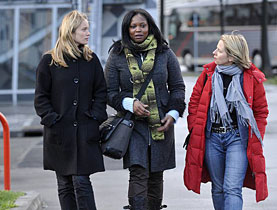Trafficked women “need more protection”

Victims of trafficking, who are often forced to work in the sex industry, should be offered more protection in Switzerland, expert Stella Jegher tells swissinfo.ch.
Jegher, coordinator of women’s rights issues at Amnesty International’s Swiss Section, has been involved in a campaign calling for victims to be allowed to stay in the country for a longer time.
She was also one of the speakers at a conference on women trafficking, organised by several groups including Amnesty, which took place in Zurich earlier this week.
On May 28 parliament rejected a motion calling for more protection of trafficking victims.
swissinfo.ch: Do we know what the extent of the trafficking problem is in Switzerland?
Stella Jegher: We don’t have really viable figures. What we have is a figure that is banded around all the time, which is between 1,500 and 3,000 victims. This number is actually an extrapolation of an international report about victims of trafficking and NGOs don’t really believe this number. What is perhaps more concrete is the number of trafficking victims counselled by specialised NGOs, such as the FIZ women’s rights organisation. Last year they had around 160 women victims of trafficking.
There is also the number of trafficking convictions, which is very small – in the past ten years maybe around 15-20. But in general we do not know very much about the issue because it concerns illegal work and status of people.
swissinfo.ch: So the real number could be higher.
S.J.: I wouldn’t say that there are more women victims of trafficking than we know about, but it exists and… it could become even bigger now with the economic crisis. There is the risk that many women searching for work end up being trafficked into prostitution.
swissinfo.ch: Who is being trafficked into Switzerland?
S.J.: There is a lot of trafficking from eastern Europe. This is growing because of the new bilateral agreement on the free movement of people with the European Union, which also includes countries like Romania and Bulgaria. Some women are here with a legal status, but are still forced into prostitution. There are women from African countries like Cameroon and Nigeria, this is mainly for the French-speaking part, and from Asia and Latin America.
swissinfo.ch: What conditions await trafficked women here?
S.J.: There are many different situations… Perhaps typical is the story of women promised work in another branch of the economy, in a restaurant or a household. They arrive and find themselves with a contract not corresponding to what has been promised to them, and maybe even their passport is taken away, so they can be threatened with the illegality of their status. This is one of the big means of coercion.
There are other forms, such as pressure on the family at home or that the community will be told you have been involved in prostitution. It depends on the culture the women come from.
If a victim is discovered – by a police crackdown, by clients who note that something is wrong, but also by getting help from a counselling centre – if it’s a good case she will get help. She will get specialised counselling and be dealt with very carefully concerning her reasons for being here. If it’s a bad case, she will be expelled immediately because her status may be illegal. This is one of the big threats and why we are demanding better conditions, so that trafficked women can stay here for a longer time to recover from their trauma.
swissinfo.ch: Parliament recently turned down a motion for more protection for trafficking victims.
S.J.: This motion was a follow-up to the campaign we did last year with FIZ and other organisations in which we collected more than 70,000 petition signatures on the issue. This motion especially asked for trafficking victims to have the legal right to stay here for a longer time. The fact that parliament just failed to pass it by three votes means that knowledge about this problem is growing in political circles.
swissinfo.ch: What more could be done to protect trafficking victims?
S.J.: We would like for it to be considered a human rights issue and as legal experts know, there is this duty of the state to protect people and especially women against human rights violations.
We would like to have it considered a state duty, not only to protect women, but also to fulfil human rights by taking positive measures to give better counselling, legal help and access to their rights to all migrant women in Switzerland. We have to consider this an issue of migration policy as well.
Isobel Leybold-Johnson in Zurich, swissinfo.ch
“The trafficking of women in Switzerland – strategies to fight it” conference was held in Zurich on June 11.
It was organised by Amnesty Switzerland, as well as FIZ and CFD, both women’s organisations, and the Zurich authorities’ equality department.
It gathered together NGO representatives, academics as well as members of the police and authorities. It was aimed at studying how strategies can be developed to fight trafficking and deal with its consequences in Switzerland.
Jegher says there is a national agency, The Swiss Coordination Unit against the Trafficking of Persons and Smuggling of Migrants which is part of the Federal Police Office, which is in charge of coordinating activities against trafficking. But there is no real national action plan. The cantons are responsible for many areas related to trafficking and the approach and degree of protection varies among them.
Switzerland has now signed up to, but not yet ratified, the Council of Europe Convention against Trafficking. Jegher says that this will affect the cantons’ policies as well. “During this procedure the issue will be of growing interest and maybe we can use it to have more national coordination,” she said.
Another problem, adds Jegher, is that there has, in Amnesty’s view, been growing xenophobia and racism in Switzerland towards migrants. It is also important that after the campaign of last year, which also focused on the European Football Championships jointly held in Switzerland, that attention on the issue is maintained.

In compliance with the JTI standards
More: SWI swissinfo.ch certified by the Journalism Trust Initiative












You can find an overview of ongoing debates with our journalists here . Please join us!
If you want to start a conversation about a topic raised in this article or want to report factual errors, email us at english@swissinfo.ch.